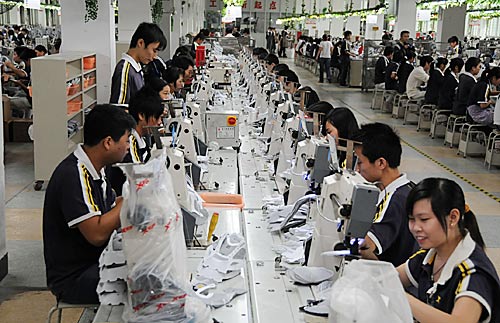|
 |
|
EQUAL FOOTING: Quanzhou, Fujian Province, pushs for a corporate system that allows employees and business owners to jointly decide payments through discussions. This shoe plant is among the enterprises that are implementing the new system (LAI JIANQIANG) |
Numbers of the Week
$30.7 billion
Bilateral trade between China and Russia in the first seven months of the year hit $30.7 billion, a 49.6 percent year-on-year increase, said the Ministry of Commerce.
389.6 billion
China's electric power consumption in July reached 389.6 billion kwh, up 13.94 percent from a year ago, said the National Energy Administration.
TO THE POINT: China shed U.S. Treasury securities in June in an attempt to diversify its investment portfolio of foreign exchange reserves. China maintained its attractiveness to overseas investments, as indicated by the FDI that rose 29.2 percent year on year in July. The country's e-commerce is bursting with vitality, with B2B businesses and online shopping burning hot. China's credit card sector is booming, but still needs regulation to ensure healthy development. The Internet portal operator Sina Corp. fared well in the second quarter, drawing strength from an online advertising boom. The global consumer products behemoth P&G makes forays into China by pledging at least $1-billion investments in the country over next five years.
By HU YUE
U.S. Treasuries Shed
China trimmed its holdings of U.S. Treasury securities in June to $843.7 billion, according to the U.S. Department of the Treasury.
This was the second straight decline, but China remains the largest foreign holder of U.S. Treasury securities, followed by Japan and the UK.
Meanwhile, by the end of June, China's foreign exchange reserves stood at more than $2.45 trillion, with the bulk in low-yielding U.S. Treasury securities.
With U.S. deficits piling up, risks of investing in U.S. dollar assets are on the rise, prompting China to diversify its portfolio of foreign exchange investments, said Zhang Ming, a senior researcher at the Institute of World Economics and Politics under the Chinese Academy of Social Sciences.
In its latest move, China snapped up $5.3 billion worth of Japanese government bonds in June, the sixth straight month of net buying, said the Ministry of Finance of Japan.
FDI Holding Up
Despite a slight economic slowdown in July, China still maintained its appeal to foreign investors.
The foreign direct investment (FDI) that flowed into China in July rose 29.2 percent year on year to reach $6.924 billion, said the Ministry of Commerce at a press conference on August 17.
The figure brought the FDI flow to China in the first seven months of the year to $58.35 billion, an increase of 20.65 percent from a year earlier, said Yao Jian, a spokesman of the ministry.
From January to July, a total of 14,459 foreign-invested companies were approved for establishment in China, up 17.9 percent year on year.
Analyzed by sector, the manufacturing industry received 47.94 percent of the FDI inflows in the first seven months, compared with 45.09 percent for the service sector.
"A stable economy, unmatched market opportunities and favorable policy environment will continue to spark interest among foreign investors," said Zuo Xiaolei, chief economist at the Beijing-based China Galaxy Securities Co. Ltd., in a report.
E-commerce Thrives
The Internet is becoming a hotbed for businesses as e-commerce takes off in China.
China's e-commerce transaction volume continued its growth streak, reaching 2.25 trillion yuan ($331.9 billion) in the first half this year and accounting for 62.5 percent of last year's total value, said the Hangzhou-based China e-Business Research Center, in a recent report.
B2B remains the most vibrant activity, accounting for 89 percent of the e-commerce market. Alibaba.com remains the market leader with a majority 54.6 percent of B2B market shares.
As a ripple effect from the financial crisis looms, small enterprises look for business opportunities on the Internet in order to save costs and bolster efficiency, said the report.
Alibaba.com raked in a juicy profit of 693 million yuan ($102.2 million) from January to June 2010, soaring nearly 40 percent, as the economy recovered and a rebound in exports boosted product listings on its website.
Meanwhile, online shopping is also experiencing a surge as Chinese consumers search for bargains on everything from cosmetics to clothes, said the report.
| 